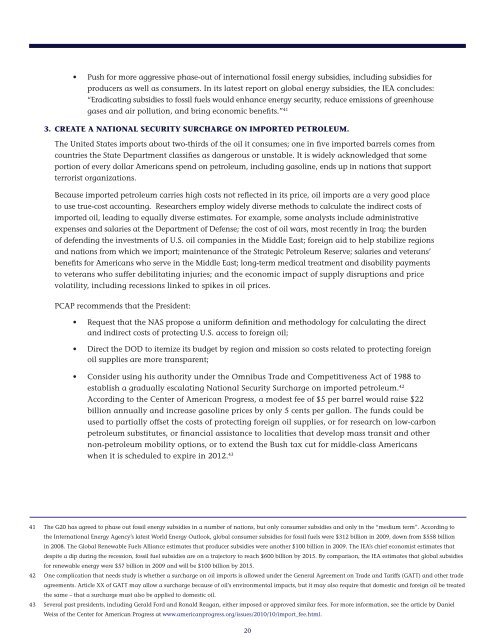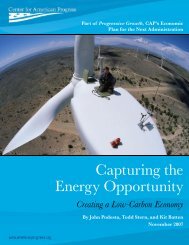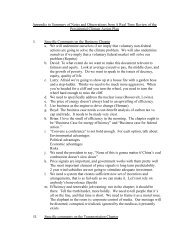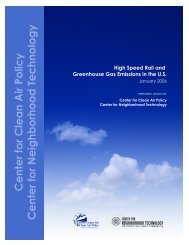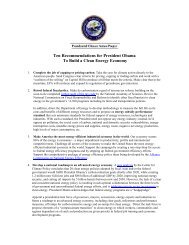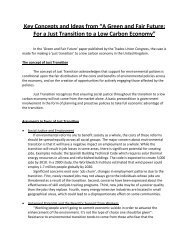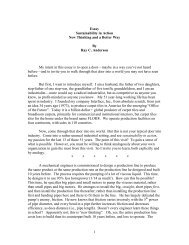The 2011 Plan - Presidential Climate Action Project
The 2011 Plan - Presidential Climate Action Project
The 2011 Plan - Presidential Climate Action Project
You also want an ePaper? Increase the reach of your titles
YUMPU automatically turns print PDFs into web optimized ePapers that Google loves.
producers as well as consumers. In its latest report on global energy subsidies, the IEA concludes:“Eradicating subsidies to fossil fuels would enhance energy security, reduce emissions of greenhousegases and air pollution, and bring economic benefits.” 413. CREATE A NATIONAL SECURITY SURCHARGE ON IMPORTED PETROLEUM.<strong>The</strong> United States imports about two-thirds of the oil it consumes; one in five imported barrels comes fromcountries the State Department classifies as dangerous or unstable. It is widely acknowledged that someportion of every dollar Americans spend on petroleum, including gasoline, ends up in nations that supportterrorist organizations.Because imported petroleum carries high costs not reflected in its price, oil imports are a very good placeto use true-cost accounting. Researchers employ widely diverse methods to calculate the indirect costs ofimported oil, leading to equally diverse estimates. For example, some analysts include administrativeexpenses and salaries at the Department of Defense; the cost of oil wars, most recently in Iraq; the burdenof defending the investments of U.S. oil companies in the Middle East; foreign aid to help stabilize regionsand nations from which we import; maintenance of the Strategic Petroleum Reserve; salaries and veterans’benefits for Americans who serve in the Middle East; long-term medical treatment and disability paymentsto veterans who suffer debilitating injuries; and the economic impact of supply disruptions and pricevolatility, including recessions linked to spikes in oil prices.PCAP recommends that the President:and indirect costs of protecting U.S. access to foreign oil;oil supplies are more transparent;Consider using his authority under the Omnibus Trade and Competitiveness Act of 1988 toestablish a gradually escalating National Security Surcharge on imported petroleum. 42According to the Center of American Progress, a modest fee of $5 per barrel would raise $22billion annually and increase gasoline prices by only 5 cents per gallon. <strong>The</strong> funds could beused to partially offset the costs of protecting foreign oil supplies, or for research on low-carbonpetroleum substitutes, or financial assistance to localities that develop mass transit and othernon-petroleum mobility options, or to extend the Bush tax cut for middle-class Americanswhen it is scheduled to expire in 2012. 4341 <strong>The</strong> G20 has agreed to phase out fossil energy subsidies in a number of nations, but only consumer subsidies and only in the “medium term”. According tothe International Energy Agency’s latest World Energy Outlook, global consumer subsidies for fossil fuels were $312 billion in 2009, down from $558 billionin 2008. <strong>The</strong> Global Renewable Fuels Alliance estimates that producer subsidies were another $100 billion in 2009. <strong>The</strong> IEA’s chief economist estimates thatdespite a dip during the recession, fossil fuel subsidies are on a trajectory to reach $600 billion by 2015. By comparison, the IEA estimates that global subsidiesfor renewable energy were $57 billion in 2009 and will be $100 billion by 2015.42 One complication that needs study is whether a surcharge on oil imports is allowed under the General Agreement on Trade and Tariffs (GATT) and other tradeagreements. Article XX of GATT may allow a surcharge because of oil’s environmental impacts, but it may also require that domestic and foreign oil be treatedthe same – that a surcharge must also be applied to domestic oil.43 Several past presidents, including Gerald Ford and Ronald Reagan, either imposed or approved similar fees. For more information, see the article by DanielWeiss of the Center for American Progress at www.americanprogress.org/issues/2010/10/import_fee.html.20


